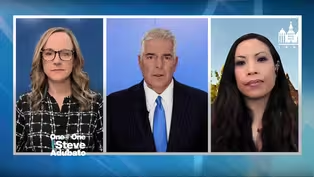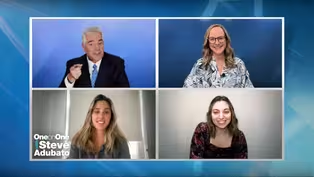One-on-One
Analyzing human trafficking and vaccine awareness
Clip: Season 2025 Episode 2827 | 8m 38sVideo has Closed Captions
Analyzing human trafficking and vaccine awareness
Steve Adubato talks with Nicole Harris-Hollingsworth, EdD, MCHES, Senior VP of Social Determinants & Impact at Hackensack Meridian Health, about the impact of human trafficking and the importance of vaccine education and awareness.
Problems playing video? | Closed Captioning Feedback
Problems playing video? | Closed Captioning Feedback
One-on-One is a local public television program presented by NJ PBS
One-on-One
Analyzing human trafficking and vaccine awareness
Clip: Season 2025 Episode 2827 | 8m 38sVideo has Closed Captions
Steve Adubato talks with Nicole Harris-Hollingsworth, EdD, MCHES, Senior VP of Social Determinants & Impact at Hackensack Meridian Health, about the impact of human trafficking and the importance of vaccine education and awareness.
Problems playing video? | Closed Captioning Feedback
How to Watch One-on-One
One-on-One is available to stream on pbs.org and the free PBS App, available on iPhone, Apple TV, Android TV, Android smartphones, Amazon Fire TV, Amazon Fire Tablet, Roku, Samsung Smart TV, and Vizio.
Providing Support for PBS.org
Learn Moreabout PBS online sponsorship(upbeat music) - Hi everyone, Steve Adubato.
Recently on our sister series "Lessons in Leadership," I sat down with Nicole Harris-Hollingsworth, who's the Senior Vice President, Social Determinants and Impact at Hackensack Meridian Health.
We talked about vaccine education, human trafficking, a whole range of important issues that are not being discussed enough in media today.
Nicole talked about these issues, particularly this issue of human trafficking with worldwide events taking place in New Jersey, like the World Cup.
Check out this compelling, important conversation.
- Doctor, good have you with us again.
- Glad to be here.
- Now we're taping this at the end of January, 2025.
It'll be seen later, but January, we were just talking before we got on the air, is in fact Human Trafficking Awareness Month.
First talk about the crisis of human trafficking as to where we are right now, and then we'll talk about why it is a potentially bigger problem as the World Cup comes to New Jersey in this region.
Please, Doctor.
- Right, so human trafficking is the use of force, fraud, or coercion to entice or force someone into acts of sex or labor against their will.
This is a tremendous issue, not just because unfortunately the United States and Mexico are number one and two in the world as it relates to human trafficking, but with the upcoming World Cup and Club games that are going to be occurring in the state of New Jersey, we know that that activity is going to increase dramatically over the next several months and up until the end of World Cup.
- Why is that, that it increases?
I've always heard that, but I don't really understand why and please share with our audience.
- Sure, so we're scheduled to get approximately a million new visitors to our state over the course of these games.
Unfortunately, with large sporting events, this is a business for some, and so they travel to wherever the large sporting event is to offer these services, both in terms of the sex trade, but more importantly in terms of the labor trade.
A lot of the construction workers and the like that are engaged are being trafficked.
They're coming in against their will.
- Help us understand, to what degree is the issue of human trafficking from your vantage point seen as a high-priority situation, problem, that must be confronted?
- Right, so human trafficking is such a high priority that it's been named for our institution one of the top seven areas of focus for 2025, and it's human trafficking and the violence that comes along with it.
We know that while there are the two main types of human trafficking, both sex trafficking and labor trafficking, with the increase of migrants, with the increase of changes just in laws around immigration and services, that we're gonna see people vulnerable to that plus baby trafficking and organ trafficking and all sorts of, you know, untoward enticements that will keep people unfortunately bonded in this way.
- When you say it's one of the seven priorities of the organization, to do what?
- So it is our priority to both address the human trafficking that we're seeing within our patient population, but also ensure that they are connected to community resources.
We know that the average trafficking victim comes into a hospital seven times before they're willing to admit that they're being trafficked.
So we wanna make sure that for anyone who is brave enough to disclose their status, that we're able to connect them to the community services and to transition them from being a human trafficking victim to a human trafficking survivor and make sure that they're connected in a way that brings them back into independence.
- Doctor, I'm gonna try to broaden this discussion in this way.
Big picture question, I know.
There are a significant number of Americans who quote, don't trust the public health infrastructure, particularly five years after COVID became a horrible reality in our lives.
To what degree do you believe the leaders in the public health community need to communicate in ways that are not just understood, but trusted at a higher level?
I know it's a loaded question, but if we don't trust those who know best, then who in the heck, who the heck are we trusting?
- That is a loaded question.
- I know, but is it a legitimate question in terms of public health and information about public health?
- Right, so the basic understanding between healthcare and the community is that a hospital is a place that should be safe.
And so when you're looking at the way in which we're communicating, what we communicate is safety.
Come here and be safe.
You know all of the laws, come here and be safe.
We will take care of you.
We will protect you.
So related to human trafficking or any other priority, we have to continue to communicate that message.
We will help you be safe.
We will help to, if you get yourself in some kind of trouble, we will help rescue you.
And that's again, what we saw in COVID.
And unfortunately it's what we believe we're gonna see in human trafficking.
During COVID, despite the confusions, people still, in the end, when it all went wrong, you come to the hospital.
You know, when it comes to human trafficking, we want you to know if it's all going wrong in life, come to the hospital and we will ensure that we can connect you to places that will help you be safer.
- Extremely well said.
And also, let me add this, one of the other areas outside of human trafficking that we're going to be engaged in a public health awareness initiative and cooperation with HMH involves vaccine education, vaccine awareness.
Why?
And I'm not gonna get on my soapbox, but I'll just say this because credible, legitimate, accurate, important information about vaccines is more important than ever before.
Doctor, if you wanna comment on that, fine.
If not, it's okay.
But it seems to me that is our responsibility, please.
- Right, I believe I agree with what you're saying.
I do believe that hospitals do have that credibility.
We at HMH have that credibility on both sides of it.
We have both the credibility around our information as well as the longevity.
We are going to be here.
HMH through its various iterations, has been in New Jersey and at the heart of New Jersey for more than a hundred years through its varying incorporated hospitals.
We're going to be here for the long run to help people.
And you know, being vaccinated is a part of the public health responsibility and the community's commitment in keeping itself safe.
- Doctor, cannot thank you enough for joining us.
I promise you, as things move forward, particularly on the public health front, we will have you back to join us and get us up to date with accurate, important, credible information.
Thank you, Doctor.
- All right, thank you, Steve.
- You got it.
Stay with us, we'll be right back.
- [Narrator] One-On-One with Steve Adubato is a production of the Caucus Educational Corporation.
New Jersey Sharing Network.
The North Ward Center.
United Airlines.
IBEW Local 102.
Valley Bank.
Robert Wood Johnson Foundation.
NJ Best, New Jersey’s five-two-nine college savings plan.
PSE&G.
And by EJI, Excellence in Medicine Awards.
Promotional support provided by ROI-NJ.
The New Jersey Business & Industry Association.
- If you register as an organ donor, you have the potential of saving up to eight lives.
- My neighbor passed away.
His eyes were actually donated and that person now can see.
- Not only can you save a life, but if something should happen to me and I'm no longer here, I know that in some small part I'll live on in someone else.
- Say yes, save lives.
- Say yes, save lives.
- Say yes, save lives.
- Be an organ and tissue donor.
Creating a community care model for student mental health
Video has Closed Captions
Clip: S2025 Ep2827 | 9m 19s | Creating a community care model for student mental health (9m 19s)
Onboarding and learning in a remote work environment
Video has Closed Captions
Clip: S2025 Ep2827 | 10m 30s | Onboarding and learning in a remote work environment (10m 30s)
Providing Support for PBS.org
Learn Moreabout PBS online sponsorship
- News and Public Affairs

Top journalists deliver compelling original analysis of the hour's headlines.

- News and Public Affairs

FRONTLINE is investigative journalism that questions, explains and changes our world.












Support for PBS provided by:
One-on-One is a local public television program presented by NJ PBS

